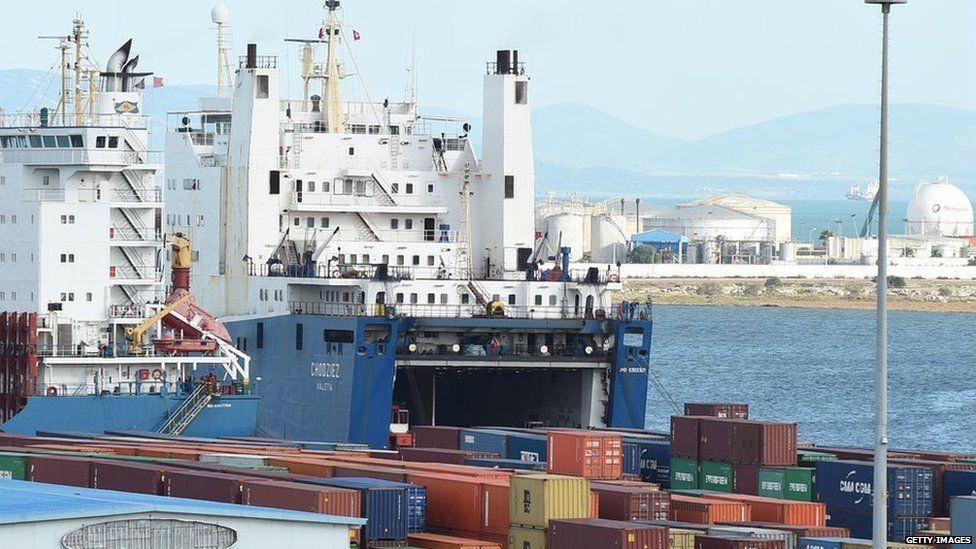Have we passed the peak era of globalisation?
- Published
- comments

This weekend many of the world's top central bankers met in the picturesque setting of Jackson Hole in Wyoming to debate "inflation dynamics and monetary policy".
Bank of England Governor Mark Carney was in attendance and his speech "Inflation in a globalised world" is well worth taking the time to read.
Mr Carney's talk opened with a provocative question: "In this era of hyper-globalisation are central banks still masters of their domestic monetary destinies? Or have they become slaves to global factors?"
Or, as a cynic might put it, does what the Bank of England decides to do with interest rates really matter? Or is the pace of inflation determined more by events overseas?
Unsurprisingly, Mr Carney offered a forthright defence of the importance of the Bank of England.
He argued that whilst global factors play a role - through the impact of commodity process, which are set globally, through trade linkages and through the international financial system - that ultimately domestic conditions were also important.
And those domestic conditions could be changed by Bank of England monetary policy.
That's no doubt true and to say that the level of inflation in any country is totally unrelated to what is happening in that country is an argument that very few would make.
But I do wonder if the Governor has overstated the case and I also wonder if some of the more fundamental assumptions behind it are still the case. Is the world really still "hyper-globalised"?
Taking a step back, the big question facing UK monetary policymakers is: why has it got so much harder to keep inflation at a low and steady level?
From the early 1990s until 2008, inflation was broadly stable. But since then it's been unusually volatile - rising to 20-year highs above 5% in 2011 and now a 50-year low of zero.
The era of "pretty much close to 2%" suddenly feels very distant.
The traditional story of how Britain went from having high and volatile inflation in the 1970s and 1980s to low and steady inflation in the subsequent 20 years is "better policy making".
This story is especially popular with policymakers.
The tale runs something like this: Thatcher-era supply side changes in the 1980s (reducing trade union power, liberalising markets and lower taxes) created an economic model less prone to inflationary pressure - reduced bargaining power meant that wages were less likely to spike higher driving up costs.
The fruits of these changes started to appear in the 1990s.
Adding to this - and perhaps more importantly - the Bank of England adopted an explicit policy of targeting low and stable inflation in 1992, and in 1997 this was taken one step further by Labour, who granted the bank independence to decide the level of interest rates to meet this target.
Less tempted than politicians to let a boom run on until some arbitrarily chosen date (that might just coincide with an election), a central bank run by central bankers should be better able to keep inflation in check.
There is a lot of truth in this traditional yarn. Independent central banks do generally do a better job of controlling inflation, the supply side changes of the 1980s did make the UK less inflation-prone. But that doesn't make them the whole story.
As Mr Carney acknowledged, global factors play a role and the era of low and steady inflation across the West was also an era of intense globalisation - specifically, the era in which China (and other Asian economies) became the workshop of the world.
Cheaper Asian-made goods helped keep the growth of prices low, and the huge expansion of the global labour force held down wage growth.
The accumulation of hundreds-of-billions of dollars' worth of foreign exchange reserves by emerging market central banks buying advanced country government bonds helped lower Western interest rates.
Whilst "better" policymaking was no doubt one factor in the more predictable inflation rates of the 1990s and 2000s, it may not have been the decisive one.
But is that still the case?
Global trade growth has been weaker than global economic since 2008 - a fairly persistent theme of this blog.
In fact the latest figures suggest global trade didn't just grow by less than global output in the first six months of this year - it actually contracted.
The causes of this trade slowdown are still being debated, but it is at least possible that we have passed "peak globalisation", that in a decade's time global trade as a share of the world economy will be lower and not higher.
Add in a report this week from Deutsche Bank suggesting that the accumulation of reserves by emerging economy central banks may have also peaked, and we are starting to look at a whole new global landscape for inflation.
The world economy appears to be going through a structural transformation and it's still not entirely clear what will emerge from it.
In the short term, a slowing Chinese economy coupled with lower commodity prices risk sending out a deflationary wave.
But in the longer term, a less integrated world economy could mean higher rather than lower inflation.
The bigger question might not be: "What is the role of Western central banks in an era of hyper-globalisation?", but: "What is their role after an era of hyper-globalisation?"